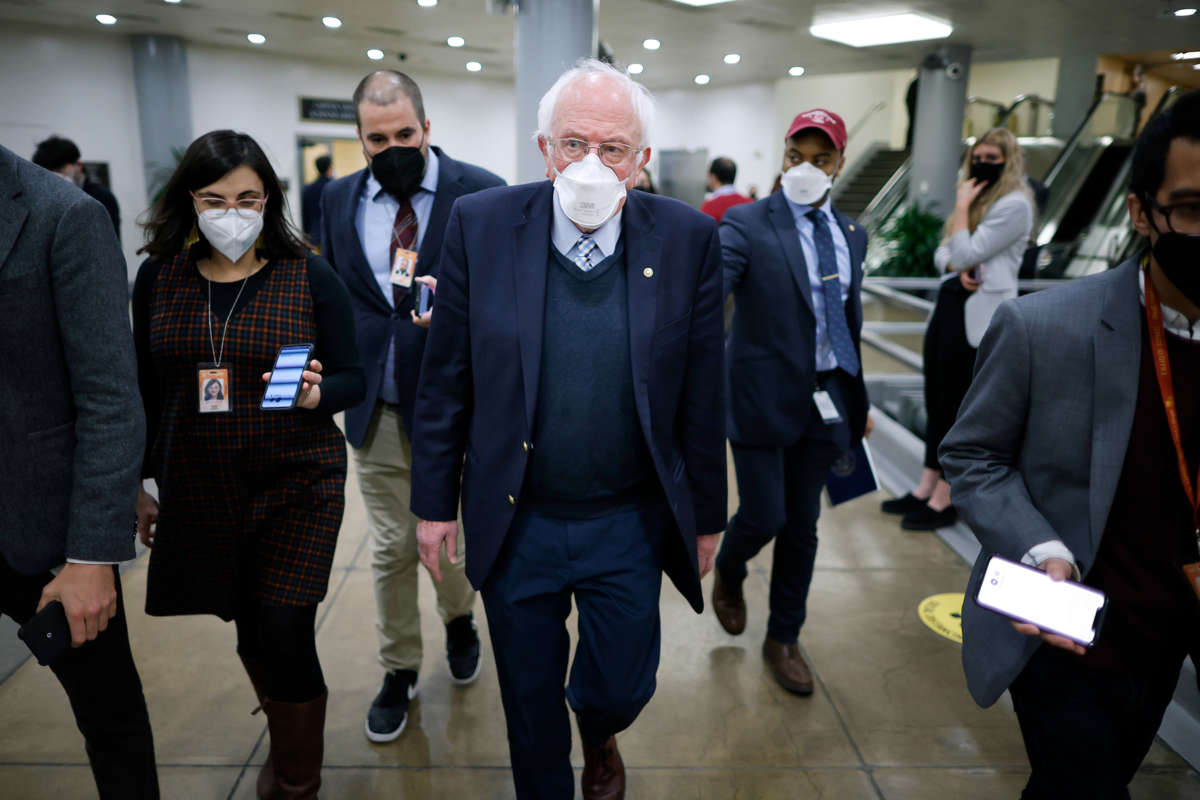Sen. Bernie Sanders on Tuesday introduced an amendment that would impose restrictions on the billions of dollars in federal subsidies and tax credits that Congress is poised to hand to the profitable U.S. microchip industry, which has been lobbying aggressively for the handouts.
Sanders’ proposed changes to the CHIPS Act, which cleared a key procedural hurdle in the Senate Tuesday evening, would prohibit companies that receive subsidies under the bill from using the funds to buy back their own stock, offshore U.S. jobs, or crack down on unionization efforts. The senator argues that no-strings-attached giveaways to the microchip industry would amount to “corporate welfare.”
“If private companies are going to benefit from generous taxpayer subsidies, the financial gains made by these companies must be shared with the American people, not just wealthy shareholders,” Sanders said in a floor speech. “In other words, if microchip companies make a profit as a direct result of these federal grants, the taxpayers of this country have a right to get a reasonable return on that investment.”
The latest version of the CHIPS Act, which now clocks in at 1,054 pages of legislative text, comes with an overall price tag of around $250 billion, tens of billions of which would be used to subsidize U.S. semiconductor manufacturing. Fresh tax language included in the bill increased the benefits to the microchip industry from around $52 billion to $76 billion.
The approval of such subsidies would be a major boon for companies like Intel, whose CEO took to the airwaves last week to implore Congress to do everything it can to pass the microchip bill.
“Do not go home for August recess until you have passed the CHIPS Act,” Pat Gelsinger, who was one of the highest-paid CEOs in the U.S. last year with a total compensation package of $179 million, said in a CNBC appearance on Friday.
“I and others in the industry will make investment decisions,” Gelsinger added. “Do you want those investments in the U.S., or are we simply not competitive enough to do them here and we need to go to Europe or Asia?”
Sanders responded directly to Gelsinger’s remarks during his floor speech Tuesday, saying, “I am thankfully not a lawyer, but that sure sounds like extortion to me.”
“What Mr. Gelsinger is saying,” Sanders continued, “is that if you don’t give the industry a blank check — here’s $76 billion, and they want more by the way — despite the needs of the military for advanced microchips… despite the needs of the medical industry for advanced microchips, despite the entire needs of the American economy for advanced microchips, the industry is threatening to abandon this country and move abroad.”
“Mr. Gelsinger says we should stay in session, if necessary, through August in order to pass this legislation,” he added. “Well, I think we might want to stay in session through August. But not necessarily to pass his legislation. Because what I hear from people in Vermont and people all across this country is that the job they want done is not a massive handout to large, profitable corporations.”
As The Daily Poster’s Julia Rock reported Tuesday, “Gelsinger’s company and its well-connected lobbyists are pushing Congress to allow it to potentially use the subsidies” in the CHIPS Act “to put more money into its factories outside of the country.”
“Intel has been one of the bill’s staunchest supporters — and Gelsinger was even invited to President Joe Biden’s State of the Union address to show his support for the subsidies,” Rock noted. “In that speech, Biden said that Intel was prepared to increase its investment in a new chip factory in Ohio from $20 billion to $100 billion, if only Congress passed the CHIPS Act. Intel is now holding that factory hostage.”
In his remarks Tuesday, Sanders likened companies lobbying for passage of the CHIPS Act to “pigs at the trough.”
“They want more and more and more,” the senator said. “Their needs are insatiable.”
Join us in defending the truth before it’s too late
The future of independent journalism is uncertain, and the consequences of losing it are too grave to ignore. To ensure Truthout remains safe, strong, and free, we need to raise $43,000 in the next 6 days. Every dollar raised goes directly toward the costs of producing news you can trust.
Please give what you can — because by supporting us with a tax-deductible donation, you’re not just preserving a source of news, you’re helping to safeguard what’s left of our democracy.
